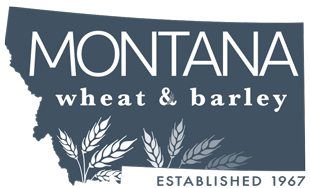By Lori Wickett, MWBC — Over the last six months, there have been some positive developments since the news announcement of HB4, the transgenic trait created by BioCeres Crop Solutions. MWBC is keeping tight track of its emergence on the world scene including the opportunity to introduce the trait into Montana State University (MSU) wheat varieties; producer response to its utility; end-user acceptance; and its demonstrated drought tolerance benefits.
A trait sourced from the sunflower, this first drought-tolerant GMO trait was approved by the USDA in wheat* last August, determining that HB4 can be safely grown for commercial use in the United States. But that news is a long way from actually putting this wheat on a truck for market.
Brad Erker, executive director for the Colorado Wheat Research Foundation, presented an update at the US Wheat Assoc. winter meeting in Washington, DC. Brad has developed a solid working relationship with BioCeres, an Argentinian company, and is encouraging other wheat states to work together in commercial partnership. While that’s certainly an option, MWBC has been working closely with MSU on best next steps toward introduction of the trait.
MSU’s plant sciences department’s breeding programs will begin to integrate the HB4 drought tolerance gene from BioCeres into Montana varieties. They are currently discussing whether to begin introgression (the process by which genetic material is transferred from one species to another through hybridization and backcrossing) within MSU’s labs versus externally at a location such as Colorado State University. There are pluses and minuses of each. Labor and the ability to integrate the HB4 trait into more backgrounds are the major factors for MSU. MSU would need to assign people to complete the crossing. However, MSU has the greenhouse space to accommodate the breeding and can easily justify the need for program control to learn what is best for varieties that work well in our region. Starting the introgression at another university will cost money, but would ensure biosecurity in a lab already accommodating HB4. It’s important to note that this isn’t MSU’s first rodeo in transgenics; they were actively working on this technology a few decades ago when MWBC funded work on the use of transgenes to increase drought tolerance and yield.
Enthusiastically, these are good decisions to be made. With the USDA’s approval, the wheat industry can now begin to work with producers to prepare for the first commercial seed, whenever that time comes. Most in the industry are saying it will be at least five years. For a drought-tolerant variety, the states that stand to gain the most from the HB4 trait are the dryest: Montana, Wyoming, Texas and Oklahoma, according to USDA data from 1995 – 2024. The eventual integration of this trait could potentially boost yields in these semi-arid regions.
So will producers want it? The answer may be found in the agronomic performance data, which will take MSU another three-plus years to begin pulling field trial data. And if the cost of seed outpaces yield gains, then producers are likely not to buy it from their local seed dealer anyway. BioCeres results across 36 trials showed that in lower-yielding conditions (averaging less than 30 bushels per acre), the trait improved yield by an average 19 percent versus the control. For regions producing 30-75 bushels per acre, the results showed a 10 percent yield increase. In higher moisture conditions, there was very little positive or negative yield impact, which is why BioCeres will target those of us in consistently dryer conditions.
Still, the open door for this new technology provides grand opportunity for any company to bring forward additional traits for potential approval by the USDA. BioCeres was willing to put their toe in the water first and certainly as their trait is introduced to a multitude of varieties and classes, they will learn from each development and make adjustments. This is all excellent news for growers fighting against drought or, down the road, other challenging issues such as wheat stem sawfly.
*News release 8/27/24 “US Wheat Associates Statement on USDA Approval of Drought-Tolerant Wheat Trait”

